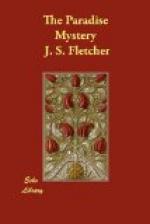“I’m not in full knowledge of all their secrets,” answered Bryce, “but I’ve heard enough to know that there’s a basis of undeniable fact on which they’re going. I know for instance, beyond doubt, that Braden and Ransford were bosom friends, years ago, that Braden was married to a girl whom Ransford had wanted to marry, that Braden’s wife suddenly left him, mysteriously, a few years later, and that, at the same time, Ransford made an equally mysterious disappearance. The police know all that. What is the inference to be drawn? What inference would any one—you yourself, for example—draw?”
“None, till I’ve heard what Dr. Ransford had to say,” replied Mary.
Bryce disliked that ready retort. He was beginning to feel that he was being met by some force stronger that his own.
“That’s all very well,” he remarked. “I don’t say that I wouldn’t do the same. But I’m only explaining the police position, and showing you the danger likely to arise from it. The police theory is this, as far as I can make it out: Ransford, years ago, did Braden a wrong, and Braden certainly swore revenge when he could find him. Circumstances prevented Braden from seeking him closely for some time; at last they met here, by accident. Here the police aren’t decided. One theory is that there was an altercation, blows, a struggle, in the course of which Braden met his death; the other is that Ransford deliberately took Braden up into the gallery and flung him through that open doorway—”
“That,” observed Mary, with something very like a sneer, “seems so likely that I should think it would never occur to anybody but the sort of people you’re telling me of! No man of any real sense would believe it for a minute!”
“Some people of plain common sense do believe it for all that!” retorted Bryce. “For it’s quite possible. But as I say, I’m only repeating. And of course, the rest of it follows on that. The police theory is that Collishaw witnessed Braden’s death at Ransford’s hands, that Ransford got to know that Collishaw knew of that, and that he therefore quietly removed Collishaw. And it is on all that that they’re going, and will go. Don’t ask me if I think they’re right or wrong! I’m only telling you what I know so as to show you what danger Ransford is in.”
Mary made no immediate answer, and Bryce sat watching her. Somehow—he was at a loss to explain it to himself—things were not going as he had expected. He had confidently believed that the girl would be frightened, scared, upset, ready to do anything that he asked or suggested. But she was plainly not frightened. And the fingers which busied themselves with the fancy-work had become steady again, and her voice had been steady all along.
“Pray,” she asked suddenly, and with a little satirical inflection of voice which Brice was quick to notice, “pray, how is it that you—not a policeman, not a detective!—come to know so much of all this? Since when were you taken into the confidence of Mitchington and the mysterious person from London?”




